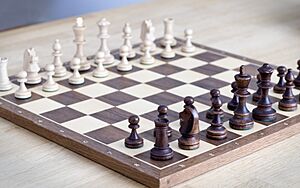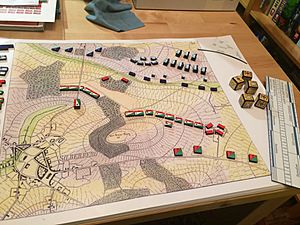Strategy game facts for kids
A strategy game is a type of game where your choices and plans are super important for winning. These games make you think ahead, like planning several moves in a board game. You need to be aware of everything happening in the game to make the best decisions.
Strategy games are often linked to war games, but they are much more than just battles. They focus on how complex the game is and the big actions you take, like placing troops in a game. A strategy game is any game that comes from the tradition of war games, uses more strategy than a typical video game, and has certain ways of playing that a community enjoys. Even though war is common in strategy games, it's not the only theme.
Contents
History of Strategy Games
The idea of strategy games goes way back to ancient times. Civilizations in places like Rome, Greece, Egypt, and India played them. Many of these games were popular in their regions, but only a few are still played today.
Mancala: An Ancient Game
One old game that is still played is mancala. It might have started in Samaria about 5,000 years ago! Mancala has many different versions around the world. In one version, two players try to clear their side of the board by moving pieces into their opponent's side. This stops the opponent from clearing their own side.
Each player also has a larger pit at the end of the board where they collect pieces to score points. When one side of the board is empty, the pieces from the other side are added to the empty side's pile. Mancala can be played casually, but it still needs good strategy. For example, you need to plan how to mess up your opponent's moves while clearing your own side.
Chess: A Game of Skill
Another game that has lasted a long time is chess. People believe it started in India around the 6th century CE (about 1,400 years ago). Chess spread to the west through trade and became very important socially. It became known as a game of great skill and tactics. Players often have to think two or three moves ahead to keep up with their opponent.
Chess also became a way to show how smart someone was. People who became "grand masters" in chess were seen as very intelligent. The game uses pieces that look like foot soldiers, knights, kings, queens, bishops, and rooks. Many of these pieces represent real positions in old European armies. Each piece moves in a special way. For example, a knight moves in an L-shape, a rook moves in straight lines, and bishops move diagonally.
Different Kinds of Strategy Games
Strategy games come in many forms. Here are some of the main types you might find.
Abstract Strategy Games
In abstract strategy games, the game's theme isn't very important, or there might not be one at all. The rules don't try to copy real life. Instead, they just make sense within the game itself.
A strict definition of an abstract strategy game means it has no random parts (like dice) and no hidden information. Games like chess and Go fit this strict definition perfectly. However, many games are still called "abstract strategy" even if they have some chance involved, like backgammon or Can't Stop. Some abstract strategy games have hidden information but no random elements, such as Stratego.
Team Strategy Games
One well-known team strategy game is contract bridge. This card game involves two teams of two players. Their skills in attacking and defending change all the time as the game goes on. Some people believe that playing team strategy games like Bridge can help you develop skills useful in business, making you better at strategic thinking.
Eurogames: Fun and Fair Strategy
Eurogames, also called German-style board games, are a newer type of game. They are somewhere between abstract strategy games and simulation games. They usually have simple rules and don't take too long to play. Players interact indirectly, and the game pieces are often simple.
Eurogames focus a lot on strategy and less on luck or fighting. They often have themes about economics instead of war. A great thing about Eurogames is that all players usually stay in the game until the very end, so no one gets left out early.
Simulation Games: Copying Reality
Simulation games try to copy the decisions and processes of a real-world situation. Most of the rules are chosen to show what would happen in real life based on a player's actions and choices.
It's hard to completely separate abstract games from simulations. You can think of games as being on a line. At one end are almost pure abstract games (like Abalone), and at the other end are almost pure simulation games (like Diceball! or Strat-o-Matic Baseball).
Wargames: Recreating Battles
Wargames are games that simulate military battles, campaigns, or even entire wars. Players have to think about situations similar to what real military leaders faced in history. Because of this, wargames are usually very focused on simulation. While all wargames are "strategy games," they can also be "strategic" (big picture planning) or "tactical" (small-scale actions) in a military sense. The creator of modern wargames, H. G. Wells, once said that a miniature war game is "much better... than the real thing."
Traditionally, wargames were played with miniatures (small models of terrain, people, and equipment) or on a board. Board wargames often use cardboard pieces on a hex map (a board with hexagons).
Some popular miniature wargames include Warhammer 40,000 and Warhammer Fantasy. Popular strategic board wargames are Risk, Axis and Allies, and Diplomacy. Advanced Squad Leader is a well-known tactical wargame.
Let's compare the Total War series to the Civilization series. In Civilization, moving troops to a certain spot is a tactic because there are no short-range decisions within that move. But in Empire: Total War (2009), when two armies meet, a real-time battle starts. So, the same movement of troops becomes a strategy because you control the battle in detail.
Throughout Total War, moving armies is a big-picture (macro) action because you can control each battle up close (micro). Even though the games are different, the skills and thinking needed are quite similar. The ideas of "micro scale" and "macro scale" help describe how a game is played. However, even very similar games can be hard to describe with the same words. In this case, "strategy" doesn't just describe what the player experiences. It's more about the different parts of the game. The similarity of actions in two games doesn't change if we call them strategy or tactics. We just look at their scale within their own game.
Strategy Video Games
Strategy video games are usually divided into two main types:
- Real-time strategy (RTS) games, where gameplay happens continuously.
- Turn-based strategy (TBS) games, where gameplay happens in separate turns or phases.
Often, the computer in these games acts like a smart opponent. It might direct armies or build things, just like a human player would. The computer can also control small actions of individual units that would be too much for a player to manage. For example, a peasant might run away when attacked without you telling them to. This means that artificial intelligence (AI) is very important in strategy video games.
See also
 In Spanish: Juego de estrategia para niños
In Spanish: Juego de estrategia para niños
- Game of chance
- Game of skill
- Mind sport




